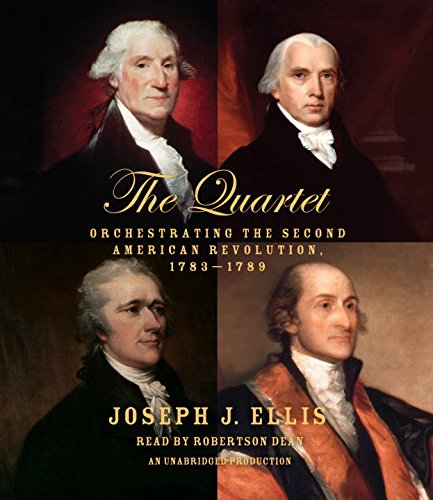
From Pulitzer Prize–winning American historian Joseph J. Ellis, the unexpected story of why the thirteen colonies, having just fought off the imposition of a distant centralized governing power, would decide to subordinate themselves anew.
We all know the famous opening phrase of Lincoln’s Gettysburg Address: “Four score and seven years ago our fathers brought forth on this Continent a new Nation.” The truth is different. In 1776, thirteen American colonies declared themselves independent states that only temporarily joined forces in order to defeat the British. Once victorious, they planned to go their separate ways. The triumph of the American Revolution was neither an ideological nor a political guarantee that the colonies would relinquish their independence and accept the creation of a federal government with power over their autonomy as states.
The Quartet is the story of this second American founding and of the men most responsible—George Washington, Alexander Hamilton, John Jay, and James Madison. These men, with the help of Robert Morris and Gouverneur Morris, shaped the contours of American history by diagnosing the systemic dysfunctions created by the Articles of Confederation, manipulating the political process to force the calling of the Constitutional Convention, conspiring to set the agenda in Philadelphia, orchestrating the debate in the state ratifying conventions, and, finally, drafting the Bill of Rights to assure state compliance with the constitutional settlement.
Ellis has given us a gripping and dramatic portrait of one of the most crucial and misconstrued periods in American history: the years between the end of the Revolution and the formation of the federal government. The Quartet unmasks a myth, and in its place presents an even more compelling truth—one that lies at the heart of understanding the creation of the United States of America.
From the Hardcover edition.

A monumental book that may well change your view of history Joseph J. Ellis makes a convincing argument that Abraham Lincoln was mistaken, maybe purposely so, in the famous opening to the Gettysburg Address. According to Ellis, the declaration of independence was not on the behalf of one united country composed of 13 states. Instead, it was for 13 independent states which formed a confederation to fight for independence from England. The drive to become one country started in 1783 continuing through 1789. The “quartet” of the title consists…
Another highly informative yet thoroughly entertaining book by Joseph Ellis A few years ago Joseph J. Ellis was involved in a confusing plagiarism scandal (the major element being that he had claimed military service when, in fact, he had not served in any branch of the military). I had enjoyed several of his previous books, in particular his splendid short biography of John Adams and his biography of Jefferson, entitled AMERICAN SPHINX, in which he found Jefferson a bit more perplexing than I believe is warranted (for a pair of splendid short biographies on Jefferson,…
Joseph Ellis and the Making of a Nation. Joseph Ellis’ new book, “The Quartet: Orchestrating the Second American Revolution, 1783 — 1789” examines the United States’ movement from independence to nationhood following the Revolutionary War. Ellis, retired as Ford Foundation Professor of History at Mount Holyoke College, has written many works about early American history and has received both the National Book Award and the Pulitzer Prize.